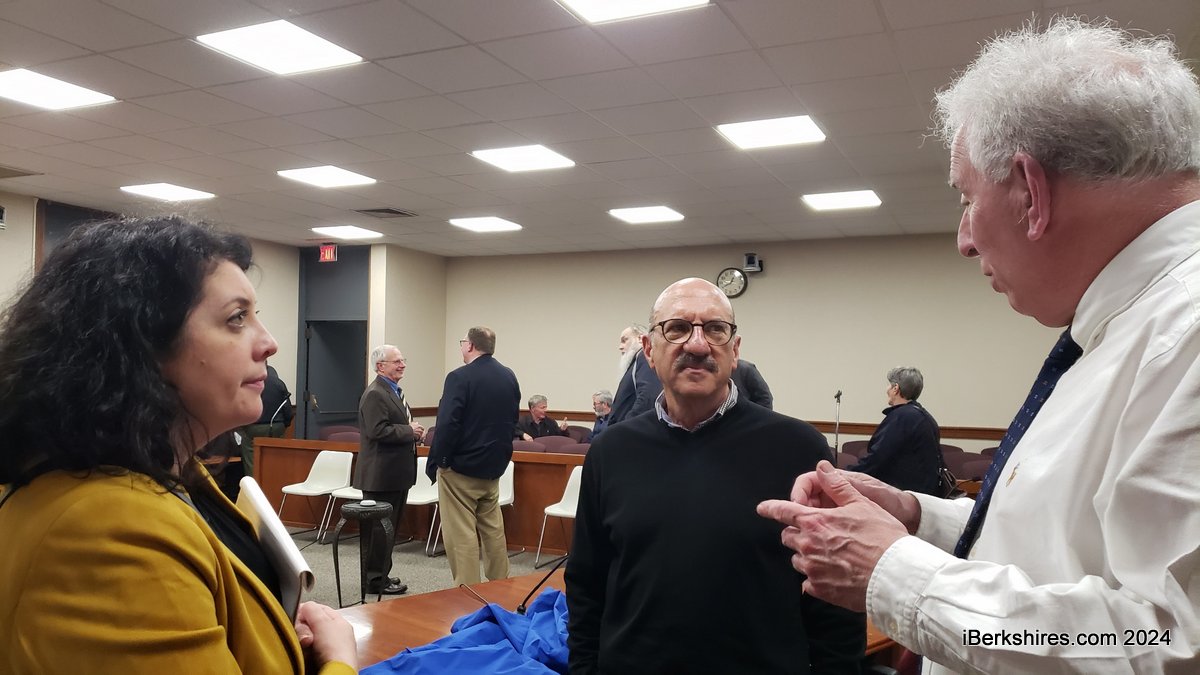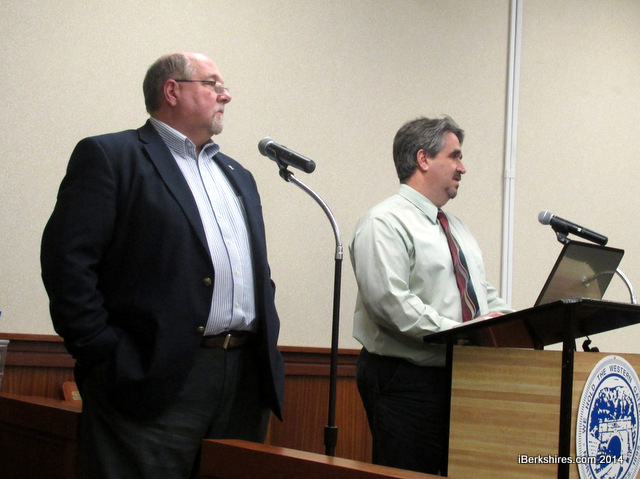
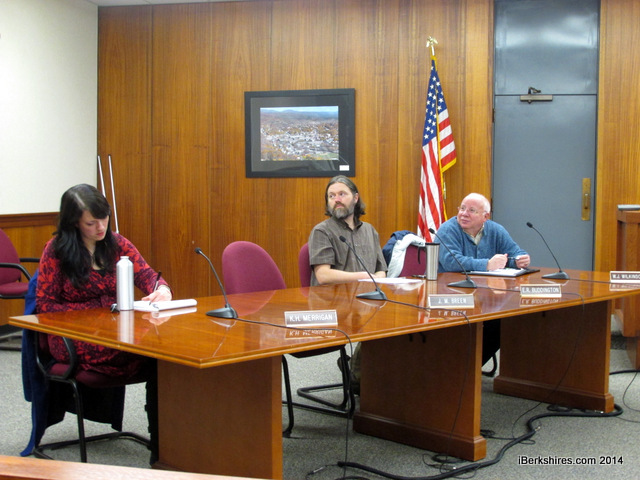
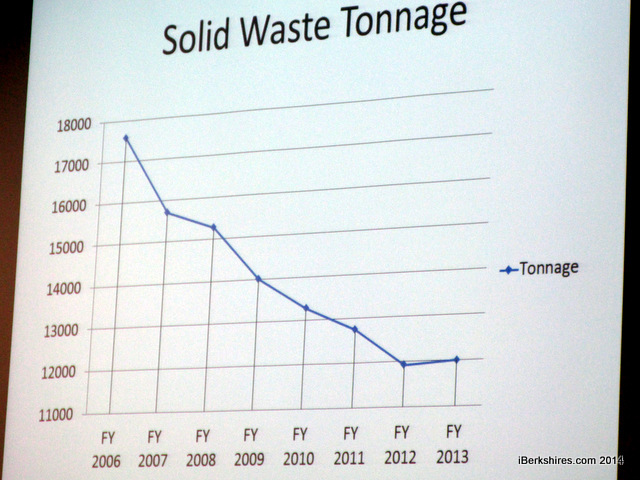
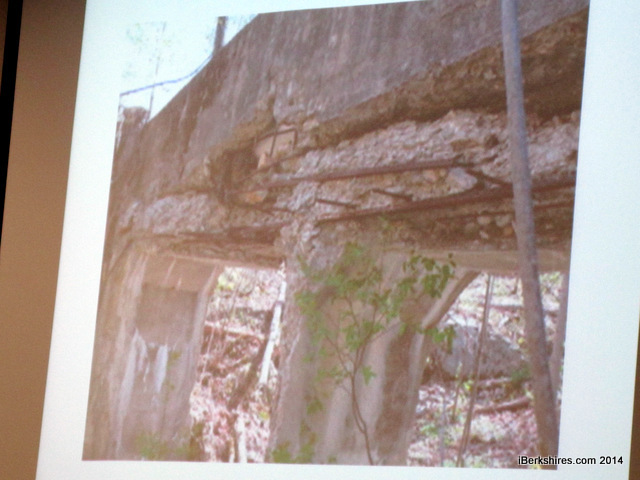
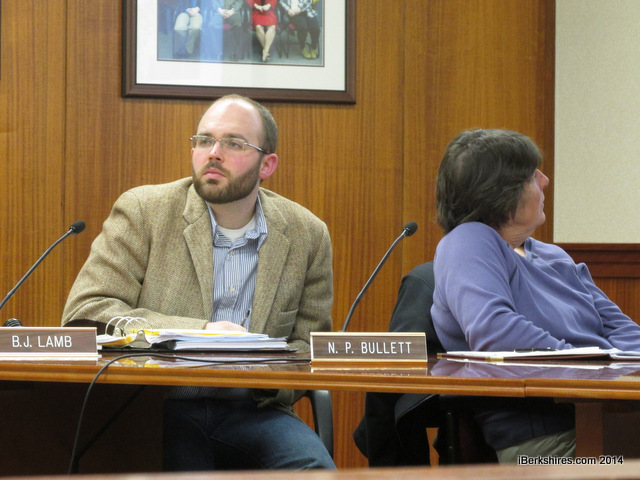

North Adams Councilors Told $60M Needed for Infrastructure
 |
|
 |
The City Council on Tuesday reviewed some of the city's infrastructure problems during a workshop meeting, including photos of the transfer station. |
NORTH ADAMS, Mass. — The city's newest councilors on Tuesday were given a depressing rundown on the infrastructure issues plaguing the city.
Mayor Richard Alcombright and Administrative Officer Michael Canales laid out an estimated $60 million in needed capital improvements ranging from deteriorating aqueducts to the city's long-neglected Department of Public Works building.
"Thanks for not sugarcoating it," said City Councilor Joshua Moran. "I guess this is also a good time for residents to know that there's a cost to living in a city and the infrastructure, you have to pay for it."
The council workshop meeting was the second in a monthly series being held in particular for the five new councilors elected in November to familiarize them with municipal operations and needs. The last meeting reviewed the different departments; the next one will cover budgeting.
The city's infrastructure issues aren't surprising. Three years ago, Public Services Superintendent Timothy Lescarbeau walked the Public Services Committee through a "20/20 plan" — $20 million in capital improvements to the city's water system over the next 20 years. The proliferation of water and sewer main breaks over the past few years also speak to the crumbling infrastructure below ground.
The conditions in the police and fire station have been well documented, as have other needs including roads and bridges.
The councilors were given an illustrated presentation of some of the worst items, including repairs required for the Veterans Memorial Bridge that actually belongs to the city, not the state. Councilors were shown rusted trucks, tarps covering electrical panels at the public safety building and DPW, blocked drains, and aged broken pipes.
Canales said the city had to get out of the "worst first" mentality in which items are fixed and forgotten while the next "worst" is attended to. Capital planning and regular scheduling for vehicle replacement and road repairs, and preventive maintenance will extend lifetimes and avert crises when everything becomes "worst," he said.
"We all know the plan we want to have, but how do you start it when you have nothing?" he asked rhetorically. "How can we kick-start it, how can we move that forward to get out of this worst-first mentality?"
He said the city could use Community Development Block Grant funding to begin work on a long-range capital plan and get assistance for some issues.
Moran and other councilors agreed.
"It's all deferred maintenance, it's what's happened over years and years of everyone using everyone and now it kind of happens that you don't have a plan," said Moran said, who thought throwing "overtime and Band-Aids" at problems was not cost-effective. "These are the pictures that show what happens when we cut, cut, cut."
The estimates for the major infrastructure issues were $20 million for the drinking water system; $10 million for sewer; $10 million toward one or more public safety buildings; $10 million for bridges; $5 million for slope stabilization and retaining walls; $3 million for the DPW building; and $2 million for the transfer station.
Councilor Eric Buddington asked if there were any grants or federal or state funding to address the issues.
"There is virtually nothing," said the mayor. He recalled how then U.S. Sen. Scott Brown had been given a tour of the public safety building in hopes he would be able to divert federal monies that way, at least toward a study. But Brown's office was unable to find any grants or subsidies. "It's really, really hard to find public money for this stuff."
What is available is funding toward transportation infrastructure such as roads and bridges, said Canales, and loans for other projects.
"We're one of 32 communities all trying to fix their downtown, their streets, their main roads, whatever it is," he reminded councilors. "Getting on the list is not hard, getting the funding is the hard part."
Alcombright said the priorities are the public safety building, which will have to be addressed within the next three years because of the order from the U.S. Justice Department to comply with Americans With Disabilities Act; the transfer station, which is in violation of state Department of Environmental Protection standards; and water filtration plant.
 Discussions have already occurred about the transfer station's future; the options are to continue accepting commercial and residential trash and recyclables; accept residential only; accept recyclables only; close it. Canales said revenues have dropped dramatically over the past few years in part because of lower payments for recyclables and more commercial haulers going to the Pittsfield incinerator facility. Any of the options presented will inevitably cause an increase of some kind for residents.
Discussions have already occurred about the transfer station's future; the options are to continue accepting commercial and residential trash and recyclables; accept residential only; accept recyclables only; close it. Canales said revenues have dropped dramatically over the past few years in part because of lower payments for recyclables and more commercial haulers going to the Pittsfield incinerator facility. Any of the options presented will inevitably cause an increase of some kind for residents.Alcombright said the public safety problem could be solved with two buildings.
"Despite what you see in the pictures, I think the current public safety building can be utilized. We don't necessarily have to get rid of that building because it's broken," he said. "We may be able to put $3 million into it and repair it as a good solid fire station, and then we find another facility that we can put $3 million to $4 million in for a police station."
The water filtration plant needs a new supervisory control and data acquisition, or SCADA, system at about $150,000 to replace the 20-year-old controls that are no longer being made. "We're really running on an old system up there and have to buy old parts from systems that were taken out of other communities," said the mayor.
There is also concern over the city's presentation to visitors and others. The mayor pointed to the improvements along Ashland Street by Moresi & Associates, Massachusetts College of Liberal Arts, the Clark Biscuit apartments and the city's own Armory compared to the City Yard.
"The guys have done a great job in keeping the yard clean ... but it's still a ratty looking building in what's becoming a nice neighborhood," he said. "We want that not only to reflect on the city but to the downtown and college connection."
Moran agreed that they could joke about the banged-up Parks Department truck but that's what visitors staying at the campground see, and it reflects badly on the city.
"I'm overwhelmed," said Councilor Nancy Bullett. "I'm going home now, but I don't think I'm going to sleep tonight. It's overwhelmingly to me ... to really realize how critical some of these things are and everything is important."
She supported a suggestion by Councilor Wayne Wilkinson to form a committee to begin looking hard at some of these issues, and possibly brainstorm ideas.
"Thank you for thinking long term because I really believe there's a lot of stability to be gained by having what you've done already," said Buddington. "By thinking 20 years ahead."
Tags: capital projects, DPW, infrastructure improvements,

